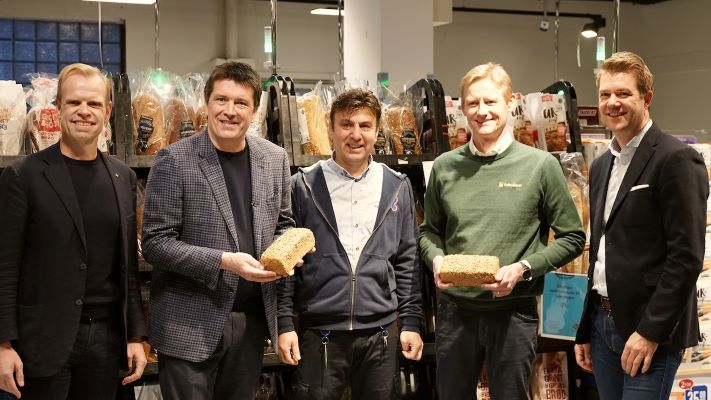The companies will use mineral fertilizers produced using electrolysis and renewable energy, adopt better agronomic practices, and leverage precision farming tools

Reitan Retail, Norgesmøllene, Felleskjøpet Agri and Yara have entered a collaboration to produce a bread, made from Norwegian oats, with lower carbon footprint. The four companies have signed a letter of intent aimed at reducing emissions from Norwegian food production, from fertilizer production to finished food products.
To achieve their goals, the companies will use mineral fertilizers produced using electrolysis and renewable energy, adopt better agronomic practices, and leverage precision farming tools.
Oats will be the first available product, with between 25-30 percent lower carbon footprint than regular oats produced with traditional mineral fertilizers.
With an optimistic outlook on the coming season, the companies aim for a bread that is healthy, tasty and affordable, and made from oats.
“Finally, we can bring together the majority of the food value chain to reduce the carbon footprint of food, from farm to fork” says Svein Tore Holsether, President and CEO of Yara. “The food system accounts for a third of global emissions, and it is not possible to reach the goals of the Paris Agreement without decarbonizing food production. With a growing population, we need to produce more food in a sustainable way. This collaboration marks an important step in the right direction.”
Ole Robert Reitan, CEO of Reitan Retail, says REMA 1000, with close to 700 discount grocery stores in Norway, is committed to facilitating informed and responsible choices for customers. However, he underlines that the biggest results from carbon footprint reduction, can only be achieved by collaborating across the value chain.
"Our ambition is to make bread with a lower carbon footprint, that is also healthy, tasty and affordable. It is impossible to succeed with such a project on your own. We need to collaborate throughout the value chain by sharing data and knowledge, and implementing actions that are in the best interests of all. Now we will all collaborate across the value chain and use Norwegian high-quality ingredients from innovative farmers. That is very exciting," says Ole Robert Reitan.
Felleskjøpet, an agricultural cooperative owned by 37,500 Norwegian farmers, distributes mineral fertilizer to farmers all over the country and serves as the market regulator for grain. They buy and sell grain from the farmers and are also an important supplier of technology and equipment to the agricultural sector.
“Norwegians expect their food to be pure and of high quality, and the food value chain that delivers them keep the same standard. At the same time, Norwegian agriculture has committed to major emission cuts as part of the Norwegian agricultural climate agreement. If the industry is to succeed with major greenhouse gas reductions, while at the same time strengthening self-sufficiency, cooperation between the different players is necessary. Our role is to represent Norwegian farmers and be open to business models and collaboration that ensures the involvement of all parties,” says Svenn Ivar Fure, CEO of Felleskjøpet.
In this collaborative effort of uniting the bread food chain, the ambition is to reduce the costs from decarbonization for both farmers and consumers. The milling group Norgesmøllene, recognized for its brand "Møllerens", produces flour, grain, bread and bakery products in Norway, and is committed to giving consumers the opportunity to make lower carbon choices in the supermarket.
“We are excited to work together to get this bread out to the store shelves, and soon everyone who bakes at home will have the opportunity to choose grain products with a reduced carbon footprint, says Jan-Eirik Eikeland,“ CEO of Norgesmøllene.
In addition to Norway's first food project involving fertilizer produced with electrolysis of water and renewable energy, the companies want to reduce their climate footprint on all levels. This could include optimizing agricultural methods, precision tools for more accurate farming, use of agricultural inputs, a transition to more low-emission transportation, as well as methods for measuring and recording carbon footprint.
"This project is a good example of collaboration to reach the climate goals and can form a template for how other companies in different parts of the value chain can also collaborate," says Petter Haas Brubakk, CEO of Food Drink Norway, The confederation of Norwegian Enterprise.
Subscribe to our newsletter & stay updated.